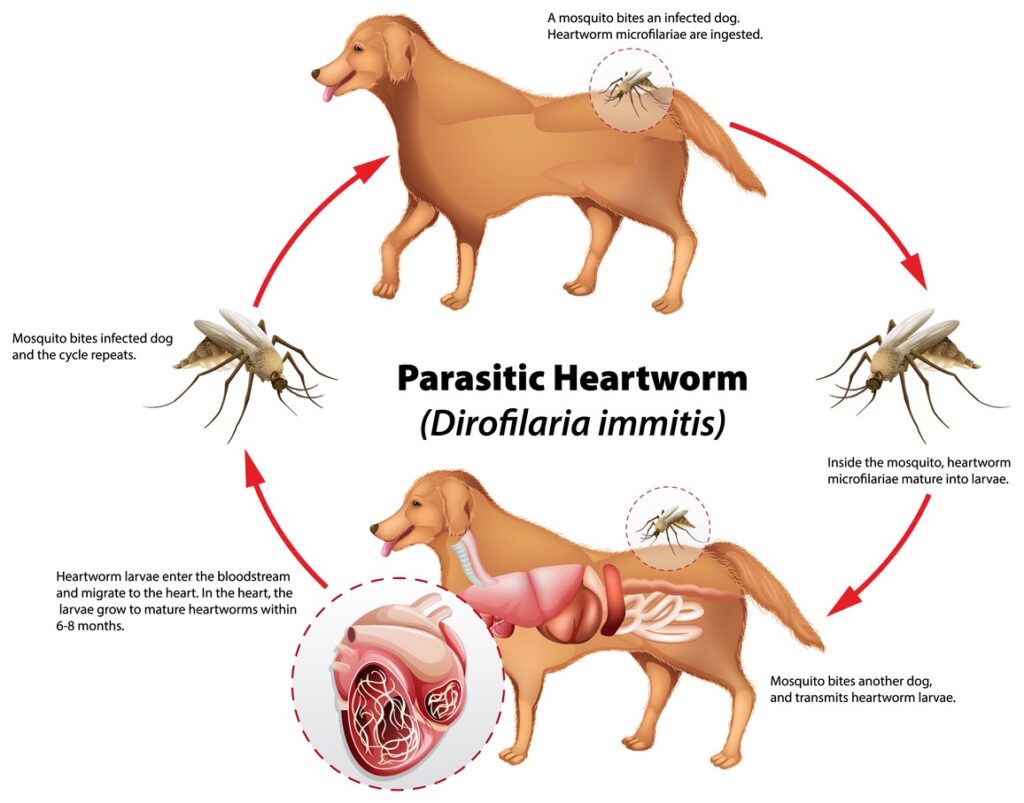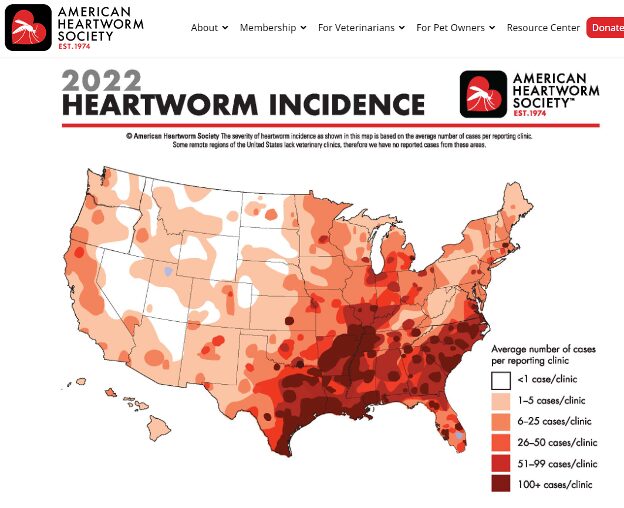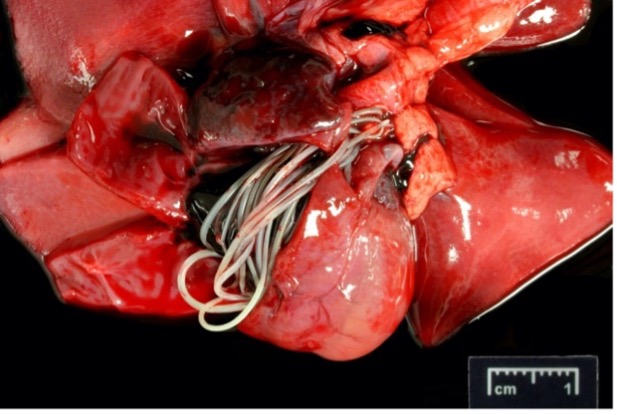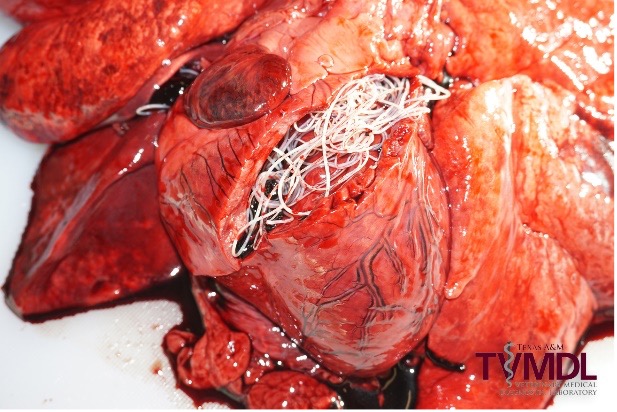April is here, and with it comes Heartworm Awareness Month, a time to shed light on the silent but deadly threat that can harm your beloved pets any time of the year. Join us in observing Heartworm Awareness Month and be part of the movement to protect your furry friends from heartworm disease year-round. Together, we can make a difference in the lives of beloved pets.
What is Heartworm Disease?
Tiny worms transmitted to pets through the bite of a female mosquito cause heartworm disease. These worms have a complex lifecycle involving multiple development stages within both the mosquito and the host animal. Pets become infected with heartworms when they are bitten by a female mosquito carrying tiny, microscopic heartworms that are injected into the pet when bitten. Once the tiny worms are in the pet, they travel through the bloodstream to the heart and lungs, where they mature and reproduce.
The Lifecycle of Heartworms

Common Misconceptions About Heartworm Disease
To protect pets from heartworm disease, it is vital we clear up common misconceptions about heartworms.
- One common misconception is that indoor pets are not susceptible to heartworm infection. However, mosquitoes can easily find their way indoors; all it takes is one bite to transmit the disease.
- Some pet owners believe that if a pet has long or thick fur, a mosquito cannot penetrate the fur. A mosquito’s proboscis (mouth) has no trouble going through a thick layer of fur.
- Another misconception is that heartworm disease only affects dogs. While dogs are more commonly affected, cats and ferrets can contract heartworm disease, and the consequences can be just as severe.
Symptoms and Signs of Heartworm Disease in Pets
This disease is often referred to as the “silent killer” because, in its early stages, it usually shows no symptoms or only very subtle ones, like a mild cough or tiredness. Pets infected may not show any signs until the disease has progressed to a more advanced stage. Significant damage may have already occurred to the heart, lungs, and other organs by this time. Below are the symptoms the American Heartworm Society lists for dogs, cats, and ferrets:
Dogs:
- Mild, persistent coughing
- Reluctance to exercise
- Fatigue after moderate activity
- Decreased appetite
- Weight loss
As heartworm disease progresses, dogs may develop heart failure and the appearance of a swollen belly due to excess fluid in the abdomen.
Cats:
Signs of heartworm disease in cats can be very subtle or very dramatic. Symptoms may include:
- Coughing
- Asthma-like attacks
- Periodic vomiting
- Lack of appetite or weight loss.
- Occasionally, an affected cat may have difficulty walking, experience fainting or seizures, or suffer from fluid accumulation in the abdomen.
Ferrets:
- Decreased appetite
- Weight loss
- Paralysis of the hind legs
- Enlarged abdomen
- Dark-colored urine
Unfortunately, in some cases, the first sign is the sudden collapse or death of the cat or ferret.
Diagnosis and Testing for Heartworm Disease
Early detection of heartworm disease is crucial for successful treatment and prevention of further complications. We typically perform a series of tests to diagnose heartworm disease, including a blood test that detects the presence of adult heartworms or their offspring. Imaging techniques like X-rays or ultrasounds can tell us the extent of the infection.
Treatment Options for Heartworm Disease
Treatment for dogs involves medication, rest, and close monitoring by veterinarians, sometimes requiring surgery.
Unfortunately, no approved drug therapy for heartworm infection in cats or ferrets exists, and the drug used to treat infections in dogs is unsafe for them. Nevertheless, we can often help cats and ferrets with good veterinary care. The goal is to stabilize your pet and determine a long-term management plan.
Heartworm Cases in Oklahoma

Prevention Against Heartworm Disease
 |
 |
Texas A & M Veterinary Medical Diagnostic Laboratory
The above picture on the left is of a ferret’s heart that died suddenly of heartworm disease. The one on the right is of a dog’s heart with heartworm. We show these pictures so you can understand that as the worms multiply and grow within the heart and lungs of a pet, they cause inflammation, damage blood vessels, and disrupt normal blood flow. If left untreated, this can lead to heart failure, organ damage, and, finally, death. Treating advanced cases of heartworm disease can be challenging and costly, and it may not always guarantee a full recovery. Therefore, prevention is essential in ensuring your pet’s long and healthy life. And follow the prescribed preventive medication’s directions to protect your pet.
Do You Need a Prescription for Heartworm Medication?
The answer is YES! Here is the reason from the AVMA:
“Heartworm preventatives are labeled as “prescription-only” because it’s critical that your veterinarian makes sure the medication is the right one based on your pet’s health status. Heartworm preventatives target infective larvae as they are migrating through the tissue prior to reaching the bloodstream and developing into adult heartworms. If your pet already has adult heartworms, giving a preventive medication will not effectively treat the disease because the preventives don’t readily kill adult heartworms.”
Also, giving a heartworm preventive to a pet infected with adult heartworms may be harmful or deadly. If microfilariae are in the pet’s bloodstream, the preventive may cause the microfilariae to suddenly die, triggering a shock-like reaction and possibly death in the pet.
The Importance of Regular Veterinary Check-Ups
Regular veterinary check-ups are essential for maintaining your pet’s overall health and well-being, including protection against heartworm disease. During these visits, Dr. Hammond can perform routine screenings for heartworm infection, assess your pet’s overall health, and provide guidance on preventive measures. He can also address any concerns or questions regarding heartworm disease or other potential health issues.
Protecting Our Pets: Taking Action Against Heartworm Disease
In closing, remember that April is Heartworm Awareness Month, a time to protect our furry friends from a hidden danger that can affect them any time of the year. It’s important to recognize the signs of heartworm infection, even when they’re subtle, and to visit the vet regularly for check-ups. Preventive measures, like giving prescribed medications and keeping up with vet appointments, are key to ensuring our pets stay healthy and happy. Let’s work together to keep your furry companions safe from heartworm disease! Contact us today!
Your Caring Team
Hammond Veterinary Hospital

